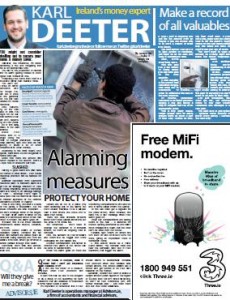 Sometimes financial decisions are not about saving money, but about spending money to avoid loss. This is what much of insurance is, it is acknowledging a risk and taking a step to mitigate that risk at an appropriate price.
Sometimes financial decisions are not about saving money, but about spending money to avoid loss. This is what much of insurance is, it is acknowledging a risk and taking a step to mitigate that risk at an appropriate price.
In finance fund managers do it all the time and call it a ‘hedge’, which is where the term ‘hedge fund’ came from. Today we are going to take this down to the more simple scenario of protecting your home and looking at the cost of doing this.
According to the most recent CSO figures there were 25,380 burglaries last year, given that there are about 2 million houses in the country that gives a 1.25% rate of break-ins per year.
While recessions lead to more crime (often property related), the break in figures since 2004 have ranged from 23,600 to 26,900 meaning that the general rate remains greater than 1%. Having been on the receiving end of a break-in twice in my life I can tell you that each time the cops said two things despite the fact that one occurrence was in Chicago and the other was in Dublin.
Firstly: we are never going to catch whoever did this. Secondly: get an alarm. An alarm system is generally the difference between being burgled and not.
So what should you look for in an alarm? Price is one thing, and we have a table for you giving a breakdown, but the actual functions are also important and we’ll untangle some of the jargon for you.
To start, every alarm is wired on the basis of a continuous circuit, when that circuit is broken the alarm goes off, typically this is via three standard components called ‘shocks’, ‘contacts’, and ‘PIR’s’.
Shocks detect blows or pulses (repeated blows), contacts are set when two sensors are parted (such as a window being open) and PIR’s are ‘passive infra reds’ and they go off when a person passes through their beam, commonly you’ll also find ‘combi’s’ which are a shock and contact in one small unit.
Cables are all run to a ‘panel’ (the main operating box of the alarm) but you’ll usually interface it via a keypad near a door where you come into or leave your house. There are also ‘wireless’ systems which don’t require cables and we have put the price in for those too, but remember – you’ll need to change the batteries in a wireless system so that is an ongoing cost to consider and the sensors on your windows and doors will be bigger and more noticeable for this reason too.
Another consideration is to monitor your alarm or not, this can be done in several ways, when the alarm goes off there are ‘monitoring companies’ who will call you and in some cases inform Garda. Or you can often get a digi-card for the panel which when installed will send you a text message when your alarm goes off.
Thankfully, the majority of alarm triggers are false alarms, but the fact remains, that thieves tend to hit houses without an alarm at a far higher rate than those with them.
Other key considerations to securing your home are to look at your lighting and weak points. Sliding doors to the rear of a house are a traditional favourite of crooks, get additional up and down locks installed so that the door cannot be lifted from the runner.
PIR lights (they work when it is dark and are set off by people crossing the beam) are a great deterrent and often help avoid accidents if you are walking outside in the dark to put out bins or what not. A final add on would be a PA switch (Panic Alarm), these are buttons – you normally have one near the keyboard and one in your bedroom) that will trigger the alarm when pressed.
Variable light timers on a lamp (you can buy a timer socket in a DIY shop for about a fiver) will turn it on and off when you are not there giving an impression there is somebody home.
If you are a dog lover then you also have an in-house deterrent, even a small dog can make a lot of noise and bigger working breeds pose a physical threat too.
The main components you need to focus on are Light, Noise and Time (make it time consuming for a burglar to break in). That’s the trinity of burglary prevention.

Post a Comment